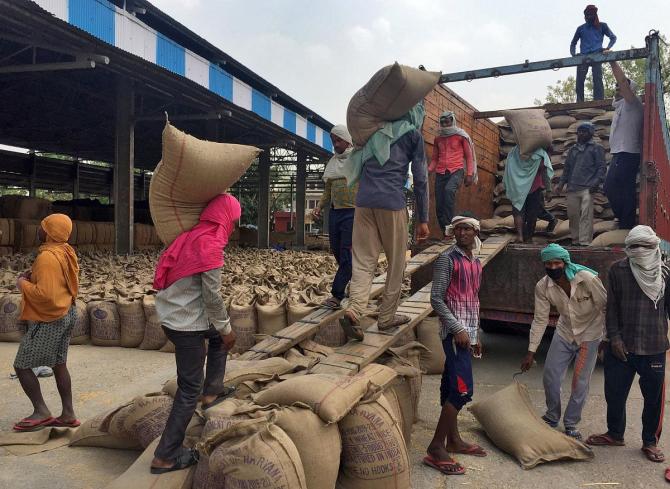After a ban on wheat exports, India’s cereal grain procurement for the central pool was struggling to rise significantly until the middle of last week, informed trade and market sources.

Farmers have been holding on to their produce as the price of wheat in the open market recouped some of the losses it suffered in the aftermath of the ban.
According to trade estimates, around 18.12 million tonnes (mt) of wheat was procured in the central pool up until May 18. Before the export ban was enforced on May 13, it was 17.96 mt.
In essence, between May 13 and May 18, an additional 160,000 tonnes of wheat was procured.
This number would have improved by the time this report was filed.
Trade sources said despite the government extending the procurement deadline until May 31 in states where it was ending early such as Haryana, in the first four days (until May 19), around 4,000 tonnes of wheat was sold via official channels in the state.
Haryana had fixed a target of procuring around 8.5 mt of wheat this year, while around 4.3 mt was procured until May 19 — a drop of nearly 49.4 per cent.
Last year, the state had procured around 8.49 mt of wheat.
“Ban notwithstanding, it seems both farmers and traders are holding on to their stocks before selling through government procurement centres because they feel in the long run, prices will remain above the minimum support price of Rs 2,015 per quintal,” said a Delhi-based trader.
On the production side, there are some questions on official estimates.
The Centre has lowered the estimate for wheat output in the 2021-22 season (July to June), from 111.32 mt in February to 106.41 mt — a drop of 4.39 per cent — but trade sources indicate that the actual crop is closer to 100 mt.
The government’s estimate, according to the third Advance Estimates, is 3.8 mt less than last year’s output as heatwave in the main crop-growing stage has hamstrung output.
On prices, traders said although the prices at mandis had slumped by around Rs 100-200 per quintal after the ban, there has been a pull-back of late.
“After dropping by almost Rs 100 per quintal in some markets of Madhya Pradesh (MP) since exports were banned, prices have recovered for superior varieties.
"This could be due to some easing of export norms and also because of the fact that good quality wheat is not available in large quantities,” said another trader.
MP was among the foremost states in exporting wheat from India due to its good quality, low taxes, and state government push.
In 2021-22, just before the ban was effected (i.e., until May 13), MP had purchased 4.11 mt of wheat —60.3 per cent less than the same period last year.












 © 2025
© 2025